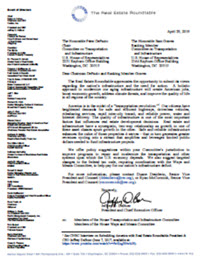The Senate Environment and Public Works Committee (EPW) unanimously approved a bill on Tuesday to authorize $287 billion over five years to repair and maintain the nation’s surface transportation. The bipartisan measure also aims to expedite the
infrastructure permitting process, help address climate change, and grow the economy. ( EPW Committee news release ,
July 30)
|
The Roundtable on April 29 submitted infrastructure policy recommendations to |
- America’s Transportation Infrastructure Act of 2019 (ATIA, S. 2302) is not the comprehensive infrastructure overhaul that Republicans and Democrats
have long sought. (Roundtable Weekly,May 3, 2019.) However, it makes
progress toward shoring-up the Highway Trust Fund (HTF) – the nation’s largest financing source for roads, bridges, tunnels, and mass transit. Congress must reauthorize and capitalize the HTF before it runs out of money by the
end of September 2020, at the height of the presidential election season. (ATIA summary and
section-by-section analysis) - The ATIA would also codify Trump Administration measures to cut lengthy
project permitting times. EPW Chairman John Barrasso (R-WY) and Ranking Member Tom Carper (D-DE) stated their bill “will speed up project delivery by codifying key elements of the President’s ‘One Federal Decision’ policy,
without forgoing important environmental protections. Cutting red tape will allow important highway infrastructure projects to be built quicker and smarter.” (July 29 CNN joint op-ed) - President Trump tweeted his support of S. 2302 on
July 30, praising the EPW Committee’s 21-0 vote as a bipartisan achievement. - The bill now moves to the Finance Committee, chaired by Sen. Chuck Grassley (R-IA), to figure out how to pay for it through tax revenues and other means. Additionally, the Senate Banking Committee, chaired by Mike Crapo (R-ID), must also mark-up
sections dealing with mass transit programs. The Senate’s No. 2 Republican, John Thune (R-SD), said funding the bill will be a “heavy lift” and that any broader infrastructure package is “really unlikely.” (POLITICO Morning Transportation, Aug. 2) - One financing source reportedly off-the-table is an increase to the “pay-at-the-pump” gas user fee that capitalizes the HTF. Congress has not raised the so-called “gas tax” since 1993, and its buying power has been significantly diminished since
then by inflation and gains in fuel efficiency. Grassley said the Finance Committee will not consider how to pay for the ATIA until Senate Majority Leader Mitch McConnell (R-KY) “says he’s willing to let a gas tax increase on the floor.”
(BGov Tax, July 31) - The Real Estate Roundtable’s infrastructure policy agenda recommends a responsible increase to the gas user fee to sustain the Highway Trust Fund for the long term;
streamlined permitting goals; and support for infrastructure innovations (such as driverless and electric vehicles) that respond to the nation’s changing demographics and accommodate increased demands for transit-oriented development.
Roundtable President and CEO Jeffrey D. DeBoer discussed the role of public-private partnerships to develop infrastructure projects on CNBC’s Squawk Box in June 2017 . ( Roundtable Weekly , June 9, 2017) Congressional committees have also received statements from The Roundtable outlining our infrastructure priorities. ( Roundtable Weekly,
May 3, 2019 and March 22, 2019 ).













